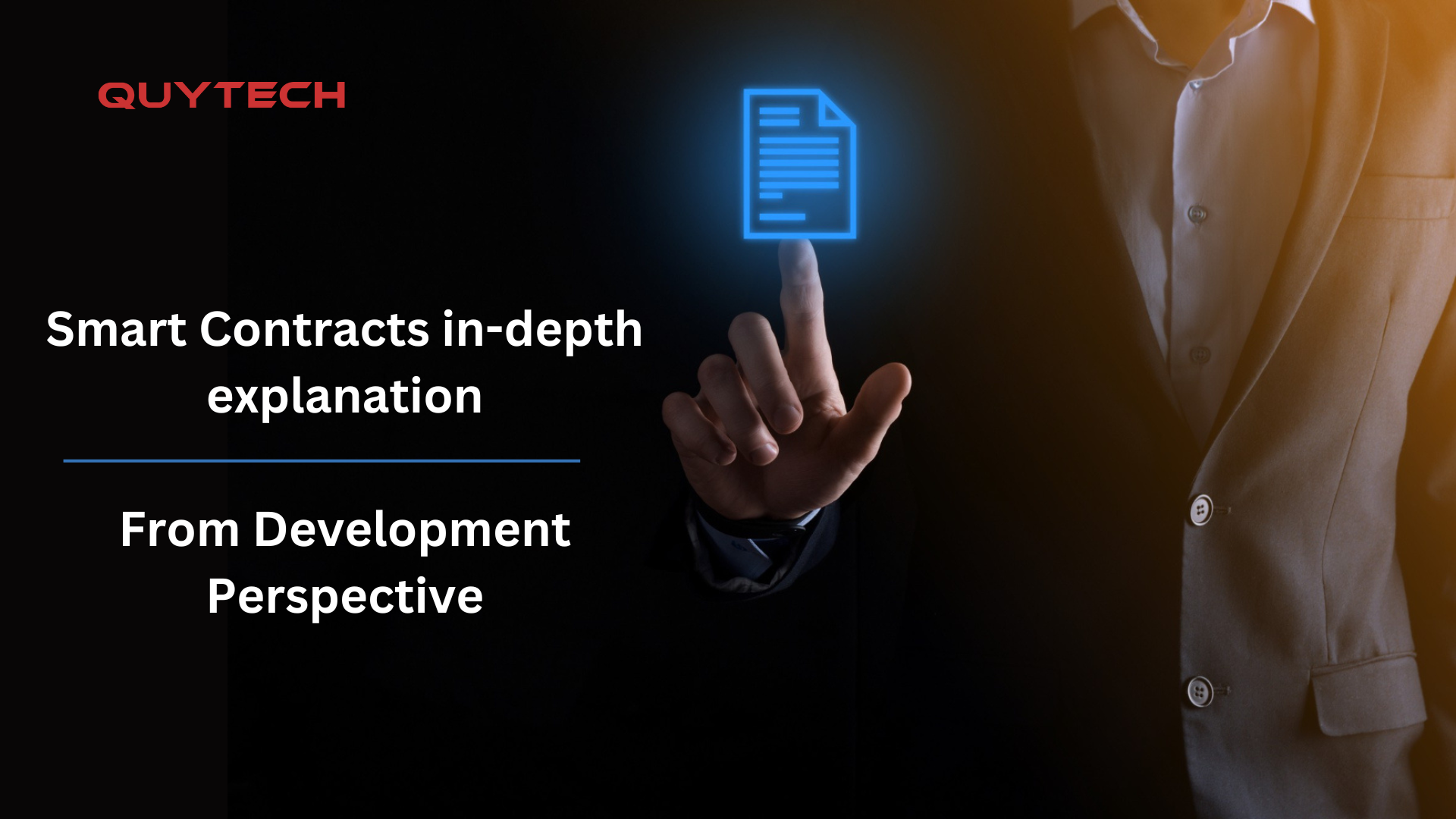Smart Contracts In-depth Explanation: From a Development Perspective
 Ewenjlin Smith
Ewenjlin Smith
Smart contracts are self-executing contracts with the terms of the agreement between buyer and seller directly written into code. They are deployed on a blockchain and automatically enforce the terms of the contract without the need for intermediaries. Solidity is one of the most popular programming languages used to write smart contracts for blockchain platforms like Ethereum. Here's an overview of Solidity syntax and best practices
Solidity Syntax
Solidity syntax is similar to JavaScript and is designed specifically for writing smart contracts.
Contracts are the primary building blocks and are similar to classes in object-oriented programming.
Functions are defined within contracts and can be called by other contracts or externally by users.
Solidity supports variables, loops, conditionals, and other control structures similar to most programming languages.
Data types include integers, booleans, strings, arrays, structs, and more.
Solidity provides features for error handling, event logging, and inheritance.
Best Used Practices To Secure Coding
Use the latest version of Solidity and regularly update dependencies to patch security vulnerabilities.
Follow the principle of least privilege by minimizing the amount of access and permissions granted to contracts.
Use secure mathematical functions and libraries to prevent overflow, underflow, and other vulnerabilities.
Implement access controls to restrict who can call certain functions and perform sensitive operations.
Use external contracts and oracles carefully, validating inputs and handling errors robustly.
Implement circuit breakers and emergency stop mechanisms to pause contract functionality in case of unforeseen circumstances.
Utilize code auditing tools and services to identify potential vulnerabilities before deployment.
Security Considerations For Smart Contracts
While smart contracts development company keeps security paramount to protect users' funds and prevent exploits. Here are some key security considerations:
Code Audits
Conduct thorough code audits by experienced security professionals to identify vulnerabilities and ensure compliance with best practices.
Use automated analysis tools like MythX and Slither to detect common security issues.
Gas Optimization
Minimize gas consumption to reduce transaction costs and improve scalability.
Avoid unnecessary computations and storage operations.
Use gas-efficient data structures and algorithms.
Common Vulnerabilities
Reentrancy Attacks: Ensure that external calls are made after state changes to prevent reentrancy vulnerabilities.
Integer Overflows/Underflows: Use safe arithmetic functions or libraries to prevent overflow and underflow vulnerabilities.
Front-Running: Implement techniques such as commit-reveal schemes or use decentralized exchanges to mitigate front-running attacks.
Denial of Service (DoS) Attacks: Avoid blocking operations and implement gas limits to prevent DoS attacks.
Choosing the Right Blockchain Platform for DeFi:
When choosing a blockchain platform for a DeFi app, consider the following factors:
Scalability: Evaluate the platform's throughput in terms of transactions per second and its ability to handle increasing network activity.
Transaction Fees: Consider the cost of transactions on the platform, as high fees can deter users from interacting with the DeFi app.
Developer Community Support: Choose a platform with an active developer community to provide support, resources, and tooling for smart contract development.
Existing DeFi Ecosystem: Assess the existing DeFi ecosystem on the platform, including available protocols, liquidity pools, and integration opportunities.
Integrating with DeFi Protocols and Oracles:
To integrate with Decentralized Finance (DeFi) protocols and oracles, developers can use relevant APIs and SDKs provided by these platforms. Here's a general guide:
Research and choose the DeFi protocols and oracles that best suit the requirements of your application.
Review the documentation and developer resources provided by the chosen protocols and oracles.
Use the provided APIs and SDKs to interact with the protocols and fetch data from oracles.
Implement error handling and data validation to ensure the reliability and security of the integration.
Test the integration thoroughly in different scenarios, including edge cases and abnormal conditions.
Importance of UI/UX Design in DeFi Apps:
UI/UX design plays a crucial role in the success of DeFi apps by providing users with intuitive navigation, clear information displays, and a seamless user journey. Here are some best practices:
Intuitive Navigation:
Design a clear and intuitive navigation menu to help users easily access different sections of the app.
Use descriptive labels and icons to guide users through the app's functionality.
Clear Information Displays:
Present complex financial information clearly and understandably, using charts, graphs, and summaries.
Provide real-time updates on account balances, transaction status, and market data to keep users informed.
Seamless User Journey:
Streamline the user onboarding process with easy-to-follow instructions and minimal data entry requirements.
Design smooth transitions between different screens and actions to create a seamless user experience.
Offer personalized recommendations and suggestions based on user preferences and behavior.
Design Examples
Compound Finance: Compound's user-friendly interface provides easy access to lending and borrowing markets with intuitive navigation and clear information displays.
Uniswap: Uniswap's simple and responsive design allows users to swap tokens seamlessly with minimal friction, making it one of the most popular decentralized exchanges in the DeFi ecosystem.
By following these best practices, developers can create secure and user-friendly DeFi apps that offer a seamless experience for users while minimizing security risks.
Benefits of Smart Contracts:
Automation: Smart contracts automate the execution of agreements, reducing the need for intermediaries and streamlining processes. This automation increases efficiency and eliminates the possibility of human error.
Transparency: Transactions on blockchain-based smart contracts are transparent and immutable, meaning that all parties involved can verify the terms and outcomes of the contract without the need for trust.
Cost Savings: By eliminating intermediaries and automating processes, smart contracts reduce the costs associated with traditional contract execution. This includes savings on fees, administrative costs, and the potential for disputes.
Security: Smart contracts are secured by cryptographic algorithms and are executed on decentralized networks, making them resistant to fraud and tampering. Once deployed, smart contracts cannot be altered, ensuring the integrity of the agreement.
Global Accessibility: Smart contracts can be accessed and executed from anywhere in the world with an internet connection, making them ideal for cross-border transactions and global business operations.
Contribution of an App Development Company
Technical Expertise: The app development company brings specialized technical skills and expertise in blockchain technology, smart contract development, and decentralized finance (DeFi) protocols.
Customized Solutions: App development companies work closely with clients to understand their unique requirements and develop customized solutions tailored to their specific needs and objectives.
Quality Assurance: App development companies conduct rigorous testing and quality assurance processes to ensure that smart contracts and DeFi apps meet industry standards and security best practices.
Continuous Support: App development companies provide ongoing support and maintenance services to ensure the smooth operation and security of smart contracts and DeFi apps post-deployment.
Innovation: App development companies stay abreast of the latest developments in blockchain technology and DeFi protocols, enabling them to incorporate innovative features and functionalities into their solutions.
Regulatory Compliance: App development companies help clients navigate regulatory requirements and ensure compliance with relevant laws and regulations governing blockchain-based applications and financial services.
By leveraging the technical expertise and industry experience of app development companies, businesses can harness the full potential of smart contracts and decentralized finance to drive innovation, efficiency, and growth.
Conclusion
Smart contracts offer a myriad of benefits including automation, transparency, cost savings, security, and global accessibility. The expertise of a mobile app development company further enhances these advantages by providing customized solutions, technical proficiency, quality assurance, continuous support, innovation, and regulatory compliance.
Through collaboration with app development firms, businesses can unlock the full potential of smart contracts and decentralized finance, paving the way for transformative applications and streamlined processes. Together, these technologies empower organizations to embrace the future of finance, ushering in a new era of efficiency, trust, and inclusivity in the digital economy.
Subscribe to my newsletter
Read articles from Ewenjlin Smith directly inside your inbox. Subscribe to the newsletter, and don't miss out.
Written by

Ewenjlin Smith
Ewenjlin Smith
Hi, I'm Ewenjlin Smith, a Business Analyst at Quytech. My expertise lies in utilizing data-driven insights and strategic planning to enhance business operations. With a proven history of optimizing processes, I am committed to fostering sustainable growth and boosting profitability through analytical proficiency.